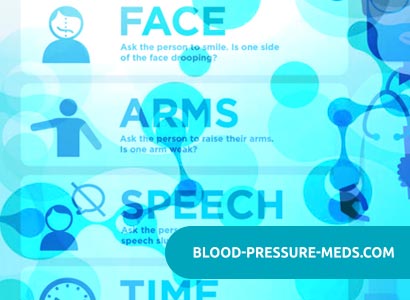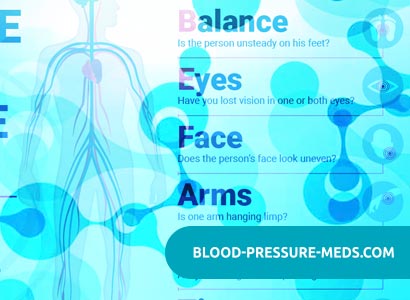Condition, Symptoms and Causes of Stroke
Stroke is one of the serious and fatal health problems. There are many factors which can cause the stroke. This disease is can be life-threatening if not treated on time. To avoid any serious consequences one should know about the signs and symptoms of a stroke.

The article covers all the factors which contribute towards stroke, as well as the symptoms and warning signs of a stroke. This article also provides a brief introduction to various different types of stroke.
General Overview of Stroke:
The location of Stroke is in the brain. It occurs due to the interruption or reduction of blood supply to a certain part of the brain. As a result of this interruption, the brain cells are deprived of essential nutrients and oxygen. And as a result, the brain cells begin to die within minutes.
Stroke is a serious and very critical health problem, it can damage the brain tissues and can cause serious complications even death. Therefore immediate and prompt medical treatment is very crucial in case of a stroke. Early treatment and medications can minimize brain damage and the risk of potential complications greatly.
Today it is possible to treat and prevent stroke. Proper medications and care can help in preventing the risks of stroke.
Types of Stroke:
A stroke can be classified into different categories based on the location and cause of stroke. The major types of a stroke include:
Ischemic stroke: Stroke which occurs as a result of blocked or narrowed arteries, which reduces or interrupts the normal blood flow to the brain. The reduced blood flow is called ischemia, and 80 percent of the strokes are the ischemic strokes.
Ischemic stroke is further classified into categories:
Thrombotic stroke: A stroke caused due to the formation of a blood clot or thrombus in one of the brain arteries, which reduces the blood supply to the brain. The clot or thrombus can be a result of fatty deposits or plaque buildup which is known as atherosclerosis. (Clot formation is one of the brain arteries)
Embolic stroke: A stroke caused by a blood clot, debris or plaque formed somewhere other than the brain (commonly in the heart or coronary artery) and moves/sweep through blood in one of the brains narrower arteries. The moving clot or debris is called as an embolus. (Clot is formed in some other artery and moves to the brain artery with blood).
Hemorrhagic stroke: it is the stroke which is caused as a result of leakage or rupturing of a blood vessel in the brain. Intracerebral hemorrhage: Hemorrhage due the rupture or leak of blood vessels inside the brain, which spills blood in the brain cells and as a result damage the surrounding cells and brain tissues.
Subarachnoid hemorrhage: Hemorrhage due to the rupture or leak of a blood vessel on or near the brain surface. The blood in this situation is spilled in the space or gap between the brain surface & skull.
Transient ischemic attack (TIA): Transient Ischemic Stroke is also known as the Mini Stroke. It is a temporary blockage or reduction of blood supply to the brain cells that can last up to 5 minutes. There is no permanent damage to the brain cells or lasting symptoms of mini-stroke.
Warning Signs and Symptoms of a Brain Stroke:
The warning signs or symptoms of all the types of stroke are usually the same but the symptoms may vary from persons to persons. It is important to pay attention to the time when signs and symptoms of a stroke begin. The longer the signs or symptoms stay, the greater damage they can cause to the brain.
Also, any delay in the treatment of a stroke can affect the chances of cure. The signs and symptoms of a stroke which you need to check if you think you or anyone around you may having a stroke are:
Trouble in Speaking: Persons who are likely to have a stroke may find it difficult to speak. He/she can slur the words or may find it difficult to speak at all.
The problem in Understanding: As the stroke occurs in the brain, therefore a person may have trouble with understanding the speech. He or she may experience confusion and could not interpret the words spoken.
Paralysis or Numbness: one of the warning signs of a stroke includes a sudden numbness or paralysis in the upper parts of your body. A person can feel numbness or weakness in the face, arms or legs. Usually, the numbness or weakness can happen on just one side of the body.
Look for Your Face: In case you think you are having a stroke trying to smile if one side of the face droop it means you are about to have a stroke.
Raise both of your Arms: in stroke, either side of the body gets numb or paralyzed or hence to know whether it’s a stroke or not, lift both of your arms above your head if either of the arms falls down, you certainly need immediate medical assistance
Distorted or Blurred Vision: Another sign and symptom of a brain stroke is a blurred, distorted or completely blackened vision either in one eye or both eyes. Some people may also experience double vision in case of a stroke.
A headache: A sudden, severe and unbearable headache. A headache can start suddenly or hours, days or even weeks before the attack of stroke. A severe headache it might be an indication of stroke and hence it shouldn’t be avoided or ignored.
Nausea, Vomiting etc.: A person may experience extreme dizziness, altered consciousness, vomiting, and nausea, along with a headache. This may indicate that the person is having a stroke.
Difficulty in Walking: A person having a stroke may stumble while walking, experiences sudden dizziness or loss of balance & loss of coordination.
Causes of a Stroke
The general or common cause of a stroke is the blockage of blood supply to the brain either due to a blood clot, debris, and plaque or ruptured blood vessel inside or around the brain. But there might be more than one risk factors and causes of brain stroke.
Brain stroke can usually be triggered by many health problems or medical risk factors. The possible medical risk factors of a brain stroke are given below:
- Hypertension - High blood pressure or stress
- Excessive use of blood thinners or anticoagulants
- Aneurysms –the presence of weak spots in blood vessels
- Arteriovenous malformation – abnormal tangling within thin-walled vessels.
- High blood cholesterol
- Diabetes – High blood sugar level
- Obstructive sleep apnea
- Personal or family history of a stroke or transient ischemic stroke/ mini-stroke.
- Cardiovascular diseases – Cardiac arrest, heart failure, heart infection etc.
- Artery Diseases – Atherosclerosis.
A brain stroke may also be a result of a lifestyle we follow. Our lifestyle plays a key role in prevention as well as causing health problems.
- Being overweight or obese.
- Excessive smoking or exposure to secondhand smoke.
- Improper and unhealthy diet
- Physical inactivity or lack of exercise.
- Heavy or binge drinking.
- Use of illicit drugs such as cocaine and methamphetamines.
Other factors that might cause a stroke include:
- Age: People at the age of 55 or more are more likely to have brain strokes as compared to the young ones. Hence age is one of the leading cause of brain strokes.
- Gender: Young men are more likely to have strokes as compared to the women but older women have a high ratio of strokes in comparison with older men. In most cases, the death of old women is caused by stroke.
- Hormones: Excessive use of artificial hormones such as estrogen or birth control pills can also cause brain stroke. Also, the naturally elevated levels of estrogen during pregnancy or childbirth can also cause brain stroke.
Complications Caused By a Brain Stroke:
A brain stroke is a medical emergency which needs to be treated immediately. The delay in its treatments not only reduces the treatment options but also increases the risk of severe complications. The possible complications of a brain stroke include:

- Loss of Muscle Movement or Paralysis: This could be temporary or permanent. Paralysis or loss of muscle movement usually happens at either one side of a body, if it’s temporary it could be treated with the physical therapy.
- The trouble with Talking and Swallowing: A severe or serious stroke might affect the muscle of your throat or mouth restricting you’re talking and eating. The difficulty to eat or swallow is known as dysphagia, difficulty to clearly talk is called dysarthria and difficulty to understand or speak the language is aphasia. All are a result of a stroke.
- Memory loss or Difficulty in Understanding & Thinking.
- Emotional Problems
- Pain, Numbness or tingling sensation in the body parts.
- Changes in Behavior
Prevention Measures for a Brain Stroke:
The preventive measures for lowering the risks of a brain stroke are majority based on changing your lifestyle. The precautions of measures which you might need, to reduce the risks of a stroke include:
- Maintain your blood cholesterol level
- Managing your blood sugar level
- Indulge in physical activity and exercise
- Eating a healthy diet which is rich in soluble fibers, omega-3 fatty acids and avoiding saturated fats.
- Marinating a normal blood pressure of 120/80 mmHg
- Use of medications such as anticoagulants and anti-platelet drugs.
- Quit smoking and limit the use of alcohol
- Proper checkup and regular intervals
 AU
AU UK
UK CA
CA DE
DE FR
FR IT
IT ES
ES


